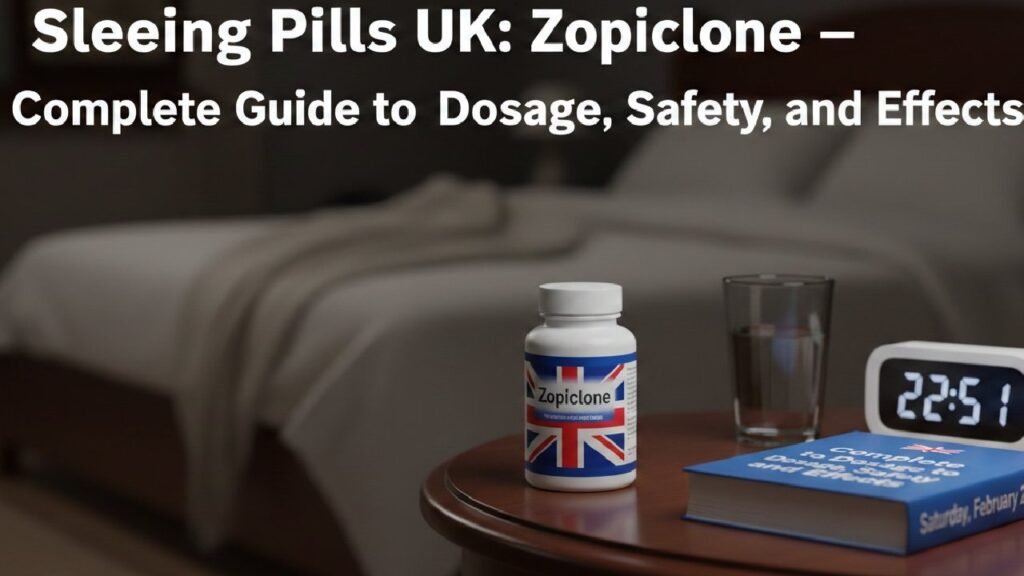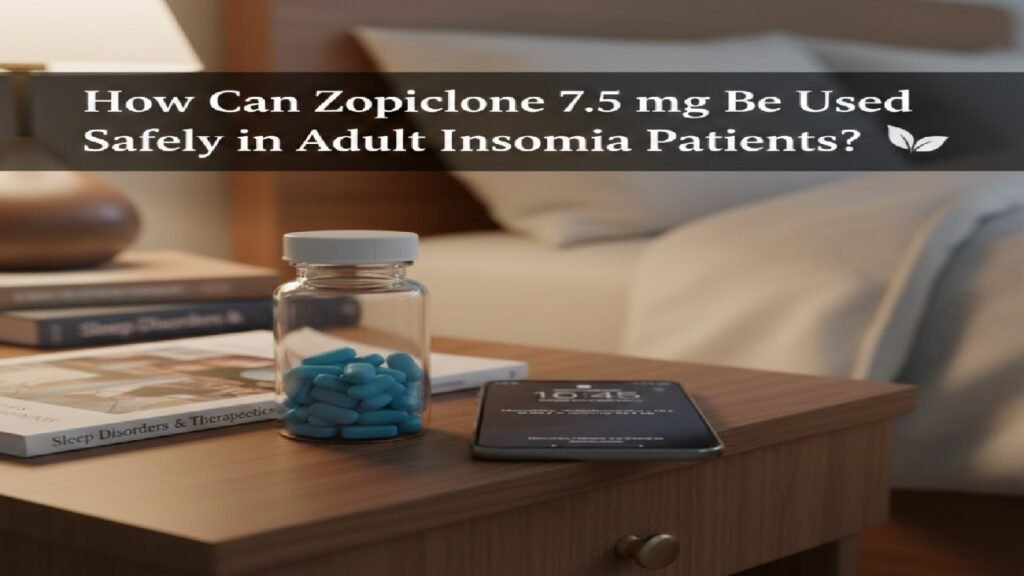Anxiety disorders and sleep problems often coexist, creating a difficult cycle for many affecting millions worldwide. Zopiclone, a widely prescribed sleeping pill, raises a common question: can it help with anxiety? This article explores the anxiolytic effects of Zopiclone, evidence from clinical studies, its off-label uses, and how it fits into managing anxiety and sleep disturbances.
What is Zopiclone?
Zopiclone is a non-benzodiazepine hypnotic medication used primarily for short-term treatment of insomnia. It works by enhancing gamma-aminobutyric acid (GABA) activity in the brain, which calms the nervous system, promotes relaxation, and aids in falling and staying asleep. Though its primary indication is for sleep difficulties, it exhibits some calming effects that relate to anxiety relief.[1][2]
The Relationship Between Anxiety and Sleep
Anxiety can severely disrupt sleep patterns, causing difficulty falling asleep, frequent awakenings, and poor sleep quality. Conversely, chronic sleep deprivation can worsen anxiety symptoms, making restful sleep both a symptom and treatment target in anxiety management.
Also Read: Zopiclone vs Other Sleep Aids: Which Is Right for You?
Zopiclone’s Anxiolytic Effects: What Research Says
While Zopiclone is not approved specifically as an anxiety treatment, evidence shows it can exert anxiolytic (anxiety-reducing) effects, particularly in the context of sleep disorders linked to anxiety:
- A double-blind placebo-controlled study investigated Zopiclone use in patients suffering from generalized anxiety disorder with significant insomnia. The study found that Zopiclone significantly improved sleep parameters compared to placebo and also reduced daytime anxiety somewhat, though other drugs like Triazolam showed mixed results with more daytime anxiety effects.[3]
- Pharmacological research on Zopiclone’s active metabolite, (S)-desmethylzopiclone, indicates that it can provide an anxiolytic effect without causing substantial central nervous system depression, meaning it reduces anxiety without severe sedation or impairment.[4][5]
These findings suggest Zopiclone may be useful in certain situations where anxiety-related insomnia is a prominent issue, providing relief by improving sleep quality and exerting mild calming effects.
Off-Label Use of Zopiclone for Anxiety
Though not the first-line treatment, some doctors prescribe Zopiclone off-label to manage anxiety symptoms that interfere heavily with sleep. This is typically short term and part of a broader treatment plan that may include dedicated anxiety medications (such as SSRIs or benzodiazepines), cognitive behavioral therapy (CBT), and lifestyle adjustments.
How Zopiclone Helps Manage Anxiety and Sleep
Zopiclone’s primary effect is promoting restorative sleep, which indirectly benefits anxiety by:
- Reducing the time to fall asleep: Faster sleep onset helps break the cycle of anxious rumination at night.
- Improving sleep continuity: Maintaining sleep reduces nighttime awakenings that increase stress and anxiety.
- Supporting better daytime functioning: Restorative sleep curbs fatigue and improves mood, which may reduce baseline anxiety levels.
However, Zopiclone should be used cautiously and not as a standalone anxiety treatment. It’s typically prescribed:
- For short-term use (2-4 weeks) to prevent tolerance and dependence.
- At the lowest effective dose for the shortest possible duration.
- Only under medical supervision ensuring it fits the individual’s clinical needs.
Important Considerations and Risks
- Potential for dependence: Prolonged or inappropriate use of Zopiclone can lead to physical and psychological dependence.
- Side effects: Including drowsiness, dizziness, memory problems, metallic taste, and in rare instances, complex sleep behaviors.
- Limited anxiety efficacy: It is not as effective as anxiolytic-specific medications and is not meant to replace them for chronic anxiety management.
- Withdrawal symptoms: Abrupt discontinuation after long-term use can cause rebound insomnia and anxiety.
Complementary Treatments for Anxiety and Sleep
For sustainable anxiety relief, Zopiclone is often combined with:
- Cognitive Behavioral Therapy for Insomnia and Anxiety (CBT-I, CBT-A): Effective non-medical treatment addressing the causes of sleep and anxiety issues.
- Anxiolytic medications: SSRIs, benzodiazepines, and other anxiety-targeting drugs prescribed based on diagnosis.
- Lifestyle modifications: Regular exercise, mindfulness, sleep hygiene improvements, and stress management techniques.
Conclusion
Zopiclone can offer anxiety relief indirectly by improving sleep quality in people whose anxiety disrupts their sleep. Its anxiolytic effects, while present, are mild and short-term. For anxiety treatment, Zopiclone should be part of a broader, medically supervised plan that balances medication with behavioral and lifestyle interventions.
If anxiety is causing sleep difficulties, consult a healthcare professional to explore the best safe and comprehensive management options. Zopiclone may help with sleep-related anxiety symptoms but is not a primary anxiety medication and should be used responsibly to avoid dependence and side effects.
Keywords: Zopiclone anxiolytic effects, anxiety and sleep, off-label uses, sleep aid anxiety relief, drug anxiety management
This detailed article combines current clinical evidence and practical advice on the nuanced role of Zopiclone in anxiety and sleep management for improved patient outcomes.[5][3][4][1]
Reffrences:
- https://www.yashodahospitals.com/medicine-faqs/zopiclone/
- https://pubmed.ncbi.nlm.nih.gov/2874974/
- https://pubmed.ncbi.nlm.nih.gov/2230061/
- https://pubmed.ncbi.nlm.nih.gov/11274997/
- https://www.sciencedirect.com/science/article/abs/pii/S0014299901008512
- https://go.drugbank.com/drugs/DB01198/clinical_trials?conditions=DBCOND0018828&phase=4&purpose=treatment&status=completed
- http://www.aimdrjournal.com/wp-content/uploads/2021/10/PY2_OA_PM1.pdf
- https://www.frontiersin.org/journals/psychiatry/articles/10.3389/fpsyt.2025.1592065/full
- https://www.elsevier.es/en-revista-clinics-22-articulo-eszopiclone-versus-zopiclone-in-treatment-S1807593222012959
- https://www.longdom.org/open-access/drug-treatment-of-insomnia-impact-of-zopiclone-86679.html
- https://clinicaltrials.gov/study/NCT03339583?tab=results
Also read: Zopiclone vs Other Sleep Aids: Which Is Right for You?





2 Responses